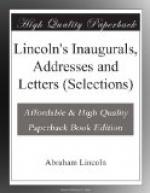One other rhetorical effort was made, in 1842, and then we find no more specimens of this class of speaking until the so-called Lost Speech of 1856. This address of 1842 was delivered before the Springfield Washingtonian Temperance Society, on Washington’s Birthday, and it is even more inflated than the first specimen. Combined with the rhetoric, however, there is a mass of sober argument that again suggests the later Lincoln. The arguments, too, are characterized by a sound common sense that is no less characteristic of the speaker. The peroration deserves quotation as being one of the finest and at the same time one of the least familiar passages in Lincoln’s writings: “This is the one hundredth and tenth anniversary of the birthday of Washington. We are met to celebrate this day. Washington is the mightiest name of earth: long since mightiest in the cause of civil liberty, still mightiest in moral reformation. On that name a eulogy is expected. It cannot be. To add brightness to the sun or glory to the name of Washington is alike impossible. Let none attempt it. In solemn awe pronounce the name, and in its naked, deathless splendor leave it shining on.” This approaches very closely the beauty and strength of the presidential period.
In 1844 Lincoln wrote several poems, which are not without merit. As a boy he was famous among his companions for his skill in writing humorous verses, but these later specimens of his muse are serious, even melancholy in their tone.
We next come to the congressional period, from 1847 to 1849. The best-known speech from this period, Lincoln’s introduction to a national public, is that of July 27, 1848, on General Taylor and the veto, Taylor being then the Whig candidate for the presidency. This speech, which was received with immense applause, owes its special prominence to the fact that it is the only purely humorous speech by Lincoln that has been preserved. The subject of the attack is General Cass, Taylor’s Democratic opponent, whom Lincoln treats in a manner that somewhat suggests Douglas’ later treatment of Lincoln on the stump. Its peroration is of peculiar interest, since it consists of a funny story.
To anyone familiar with Lincoln’s habit of story-telling the introduction of a story at the end of a speech may not seem strange. But, as a matter of fact, this is the only case of the kind that has been noted, and a careful reading of the speeches shows either that they were not fully reported or that as a rule he confined his story-telling to conversation. Even in the debates with Douglas, when he was addressing Illinois crowds from the stump at a time when stories were even more popular than they are now, Lincoln seldom used this device to rouse interest or to strengthen his argument. A partial explanation of this curious contrast between his conversation and his writing, so far as the debates are concerned, may be found in a remark made by Lincoln to a friend who




